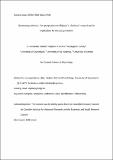Files in this item
Questioning authority: New perspectives on Milgram’s ‘obedience’ research and its implications for intergroup relations
Item metadata
| dc.contributor.author | Haslam, S. Alexander | |
| dc.contributor.author | Reicher, Stephen David | |
| dc.contributor.author | Birney, Megan E. | |
| dc.date.accessioned | 2017-04-23T23:33:57Z | |
| dc.date.available | 2017-04-23T23:33:57Z | |
| dc.date.issued | 2016-10 | |
| dc.identifier | 242220785 | |
| dc.identifier | 9c9e6719-4ab5-42c9-aac9-63e71e1c75a3 | |
| dc.identifier | 84963877136 | |
| dc.identifier | 000386878900003 | |
| dc.identifier.citation | Haslam , S A , Reicher , S D & Birney , M E 2016 , ' Questioning authority: New perspectives on Milgram’s ‘obedience’ research and its implications for intergroup relations ' , Current Opinion in Psychology , vol. 11 , pp. 6-9 . https://doi.org/10.1016/j.copsyc.2016.03.007 | en |
| dc.identifier.issn | 2352-250X | |
| dc.identifier.uri | https://hdl.handle.net/10023/10645 | |
| dc.description | This research was funded by grants from the Australian Research Council, the Canadian Institute for Advanced Research, and the Economic and Social Research Council. | en |
| dc.description.abstract | Traditionally, Milgram's 'obedience' studies have been used to propose that 'ordinary people' are capable of inflicting great harm on outgroup members because they are predisposed to follow orders. According to this account, people focus so much on being good followers that they become unaware of the consequences of their actions. Atrocity is thus seen to derive from inattention. However recent work in psychology, together with historical reassessments of Nazi perpetrators, questions this analysis. In particular, forensic re-examination of Milgram's own findings, allied to new psychological and historical research, supports an “engaged follower” analysis in which the behavior of perpetrators is understood to derive from identification with, and commitment to, an ingroup cause that is believed to be noble and worthwhile. | |
| dc.format.extent | 296050 | |
| dc.language.iso | eng | |
| dc.relation.ispartof | Current Opinion in Psychology | en |
| dc.subject | Milgram | en |
| dc.subject | Obedience | en |
| dc.subject | Conformity | en |
| dc.subject | Social identification | en |
| dc.subject | Followership | en |
| dc.subject | BF Psychology | en |
| dc.subject | T-NDAS | en |
| dc.subject.lcc | BF | en |
| dc.title | Questioning authority: New perspectives on Milgram’s ‘obedience’ research and its implications for intergroup relations | en |
| dc.type | Journal article | en |
| dc.contributor.institution | University of St Andrews. School of Psychology and Neuroscience | en |
| dc.contributor.institution | University of St Andrews. St Andrews Sustainability Institute | en |
| dc.identifier.doi | 10.1016/j.copsyc.2016.03.007 | |
| dc.description.status | Peer reviewed | en |
This item appears in the following Collection(s)
Items in the St Andrews Research Repository are protected by copyright, with all rights reserved, unless otherwise indicated.

